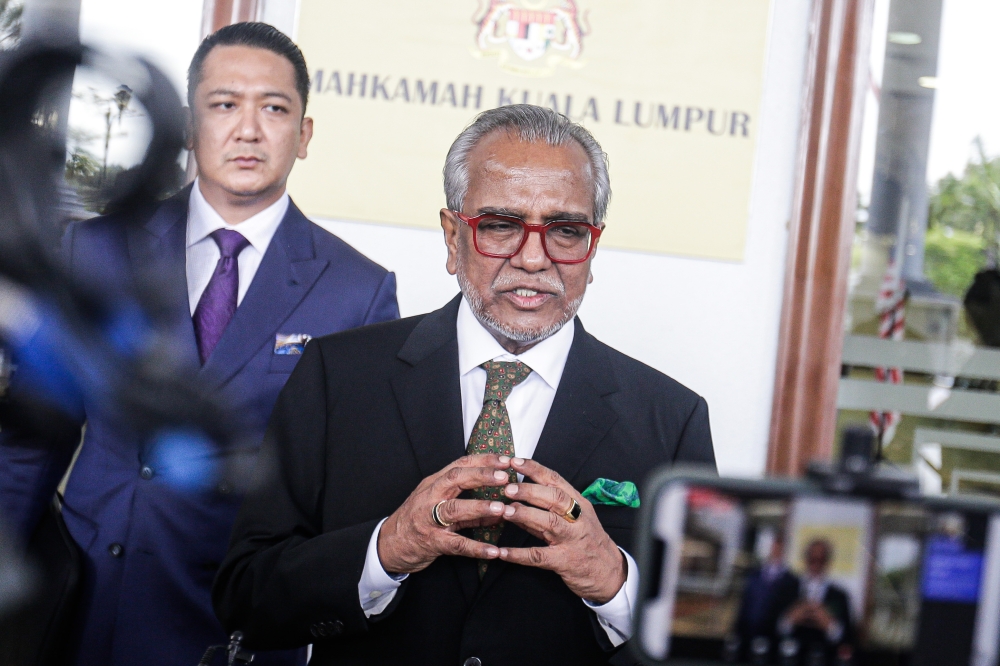PUTRAJAYA, Jan 19 — It's been a total of 150 days, or roughly five months in total, since August 23, 2022.
That is the number of days Datuk Seri Najib Razak has served of his 12-year jail sentence for the misappropriation of RM42 million of SRC International Sdn Bhd funds after failing to set aside his conviction last year.
Following his incarceration, Najib had since sought to challenge the Federal Court's five-member bench's August 2022 unanimous decision in affirming his conviction, sentence and fine meted out by the High Court.
Having exhausted all his legal avenues in Malaysia, the disgraced former prime minister is seeking to have his appeal reheard by a new Federal Court panel consisting of at least seven judges in his latest review bid.
In his affidavit filed in support of the application, Najib said he had been advised by his solicitors that the decision of the Federal Court was reviewable pursuant to Rule 137 of the Federal Court Rules 1995, with the rule allowing for a review if there had been a breach of natural justice or an abuse of process.
Opposing Najib's bid, prosecutors argued that Najib was given a fair hearing and that there had been no prejudgment of the merits of his final appeal by the Federal Court, further stating it ought to be dismissed as there must be finality in criminal appeals.
Tan Sri Muhammad Shafee Abdullah will appear for Najib while ad hoc prosecutor Datuk V. Sithambaram will represent the prosecution in the hearing fixed for 9am today at the Palace of Justice here.
What is the 'review' route again?
Rule 137 of the Rules of the Federal Court 1995 recognises the Federal Court’s inherent power to review its previous decisions in order to prevent an injustice or an abuse of process, and it has been mostly used to set aside Federal Court's decisions.
There are eight broad categories permitting a review, including where there was a coram failure; where the decision had been obtained by fraud or suppression of material evidence; and where there was a clear infringement of statutory law.
The other categories include where court bias can be shown; where the integrity of a court’s decision has been critically undermined; where the court failed to understand a clear point; and where it can be demonstrated that the judge read the wrong papers.
However, it is not guaranteed that an application for the review would be granted, as it is rare for the Federal Court to decide an appeal should be reheard.
A review application is also not equivalent to an appeal, which means it would not be about whether the appeal was correctly decided based on the evidence.
In simple words, a review bid is an application to get a rehearing of an appeal for miscarriage of justice or abuse of process that affects procedural aspects in ensuring justice without touching on facts and evidence of a case.

What has Najib been up to recently?
With the review hearing set to take place, Najib has also sought alternatives to commute his sentence and conviction.
On January 5, Najib filed a petition with the United Nations Human Rights Council Working Group on Arbitrary Detention (UNWGAD) to seek his release from prison or a retrial of his SRC International case.
He is seeking a ruling from the UNWGAD that the Federal Court's dismissal of his appeal in the SRC case was allegedly "unjust, flawed" and purportedly breaching his human rights and the Federal Constitution.
Najib is also seeking a royal pardon as stipulated in the Federal Constitution’s Article 42(1), which bestows on the Yang di-Pertuan Agong or Sultan the powers to grant a pardon or reprieve to a convict, and that it would have the effect of removing legal punishments and giving a person a “clean slate.”
As per Article 42 of the Constitution, His Majesty has the power to grant pardons, reprieves and respites in respect of all offences which have been tried by court-martial and all offences committed in the Federal Territories of Kuala Lumpur, Labuan and Putrajaya.
However, before the King can grant a pardon, he must first consult and be advised by the Pardons Board which he presides over as per Article 42(8) of the Constitution and the Board shall also consider any written opinion which the attorney-general may have delivered before tendering their advice to His Majesty.
Since Najib was charged in Kuala Lumpur, Article 42(5) stipulates the Federal Territories Pardons Board shall consist of the attorney-general of the Federation, the Federal Territories minister and not more than three members appointed by the Rulers.
By convention, a convict would have to serve one-third of their jail sentence before a pardon can even be considered — meaning Najib would have to serve at least four years in prison first — and he would still have to get in line after as there are numerous convicts who are entitled to have their cases heard beforehand.
On July 28, 2020, Justice Datuk Mohd Nazlan Mohd Ghazali found him guilty of seven charges — three criminal breach of trust charges, three money-laundering charges and one abuse of power charge at the High Court.
Mohd Nazlan, who is now a Court of Appeal judge, had sentenced Najib to 12 years in jail and fined him RM210 million in default five years imprisonment and his decision was upheld by the Court of Appeal on Dec 8, 2021.























